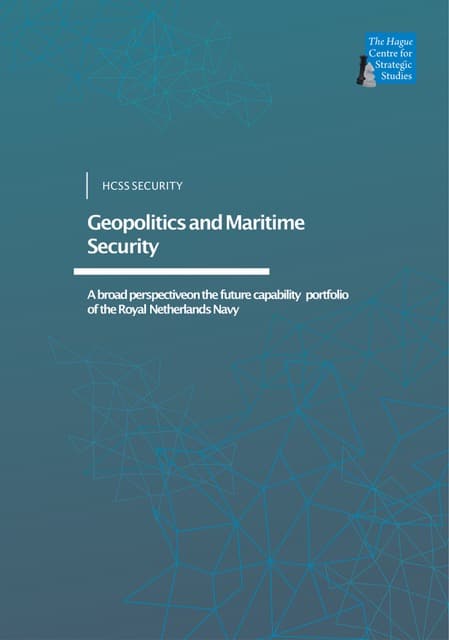This report contains the results from a research project aimed at identifying new capabilities for the future Royal Netherlands Navy (RNLN).
With the type of naval operations and tasks for the period up to 2030-35 largely enduring, the current “regional power projection” profile of the Royal Netherlands Navy (RNLN) must be strengthened and renewed. We envisage the core of the future naval force to remain a versatile mix of surface and sub-surface combatants, shipborne helicopters and unmanned systems for intelligence purposes and extended force projection, modern amphibious forces and long-range land attack capability to counter Anti-Access and Area Denial (A2AD) threats. All main vessels should be ocean-going, able to navigate the main operating theaters in the European seas and the Carib under all conditions. But even while we expect that naval operations and tasks, as well as the overall force profile of the RNLN, will evolve rather than drastically change, the RNLN must substantially innovate — but not beyond recognition — its personnel, materiel, doctrines and processes, organization and structures.
Some key lines of development for the naval capability portfolio for the period up to 2030-35 are:
-
- Unmanned systems in the air, space and on and below the sea, so-called UxVs, will increasingly take over the operational functionality of the manned ‘mother ships’ from which they are launched (and which, for the period up to 2030-35, remain the central command hubs at sea).
-
- Next to the flexibility offered by adaptive configurations of UxVs, modularity by design and provisions-for, e.g. multifunctional launch containers, will make it easier and less costly to introduce new technology on board of naval platforms.
-
- In warfighting scenarios, opponents will increasingly know the position of surface vessels in real time, making them vulnerable to long-range precision weapons. Submarines, which remain largely stealthy, will therefore play a growing role in forward offensive operations in disputed waters. The RNLN should continue to offer a highly valued contribution to allied capabilities within its niche of oceangoing, non-nuclear powered submarines.
-
- Naval land attack capabilities are required in a multi-domain approach to counter advanced A2AD capabilities. Amphibious and special operations (partially merging) launched from the sea also feature in this integrated approach.
-
- Space assets for communication, navigation and maritime situational awareness are increasingly vital to naval operations.
-
- For the next generation naval combatants, new weapon types such as energy weapons, railguns, hyper-velocity missiles and intelligent torpedoes should be contemplated, but quite possibly not initially acquired.
-
- (Counter-)mine capabilities will increasingly merge. Sea mines, as a cheap means for area denial, play an important role in e.g. various terrorist and escalating gray zone conflict scenarios. Continuous development capacity is required to keep ahead of the operational developments.
-
- In the period up to 2030-35, operations will increasingly be multi-domain and multi-level. High-quality and timely situational awareness and understanding is key, shared across domains and levels on the basis of 24/7 connectedness. Using AI and big data analysis techniques, better tools to produce actionable intelligence are vital.
HCSS CEO Paul Sinning will hand over the first copy of the printed report to vice-admiral Rob Kramer, commander of the RNLN, on July 4, 2019.
Click here to download the report.









